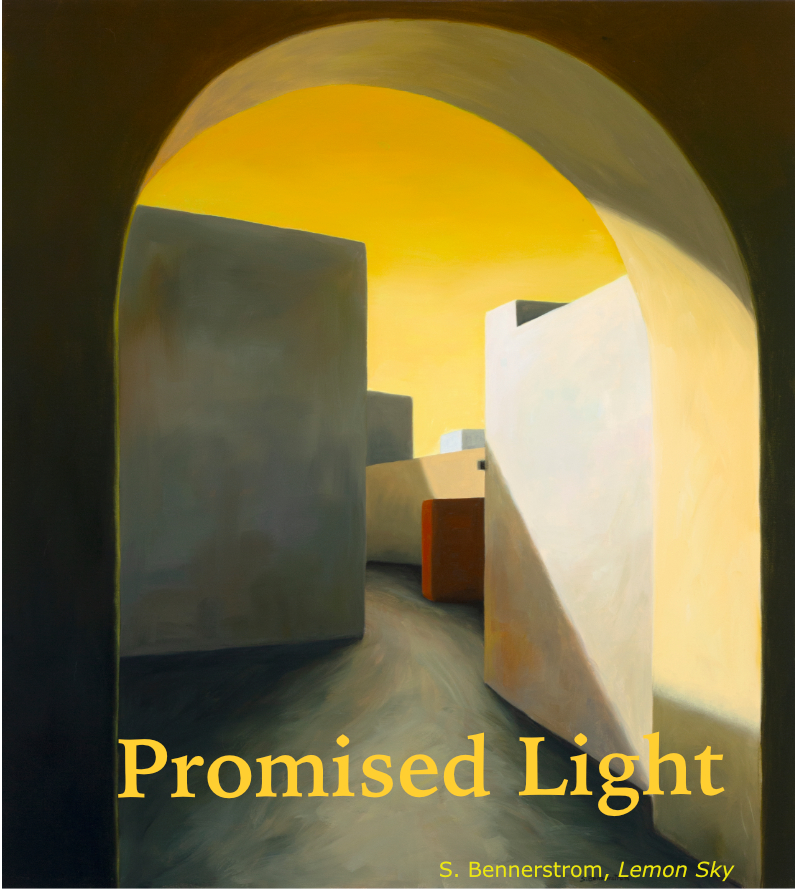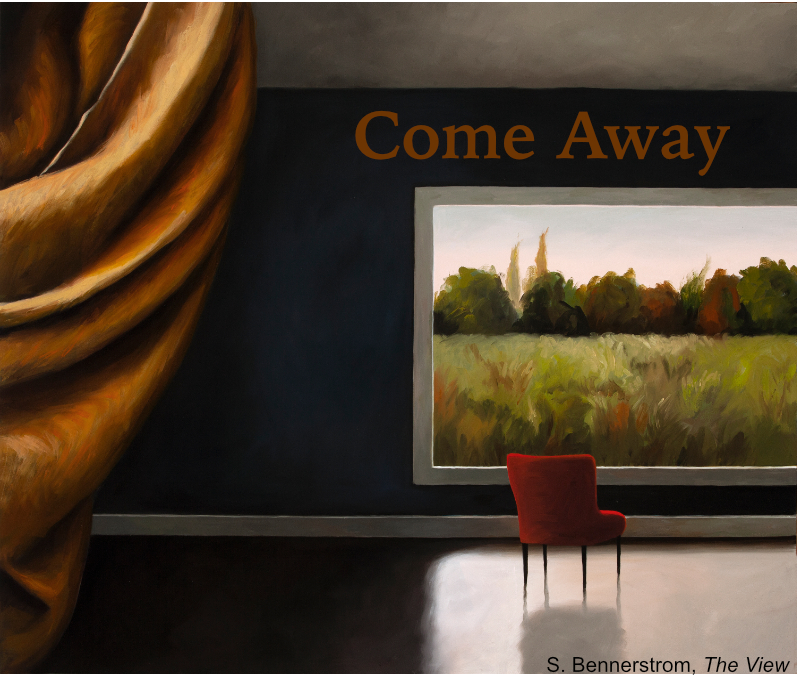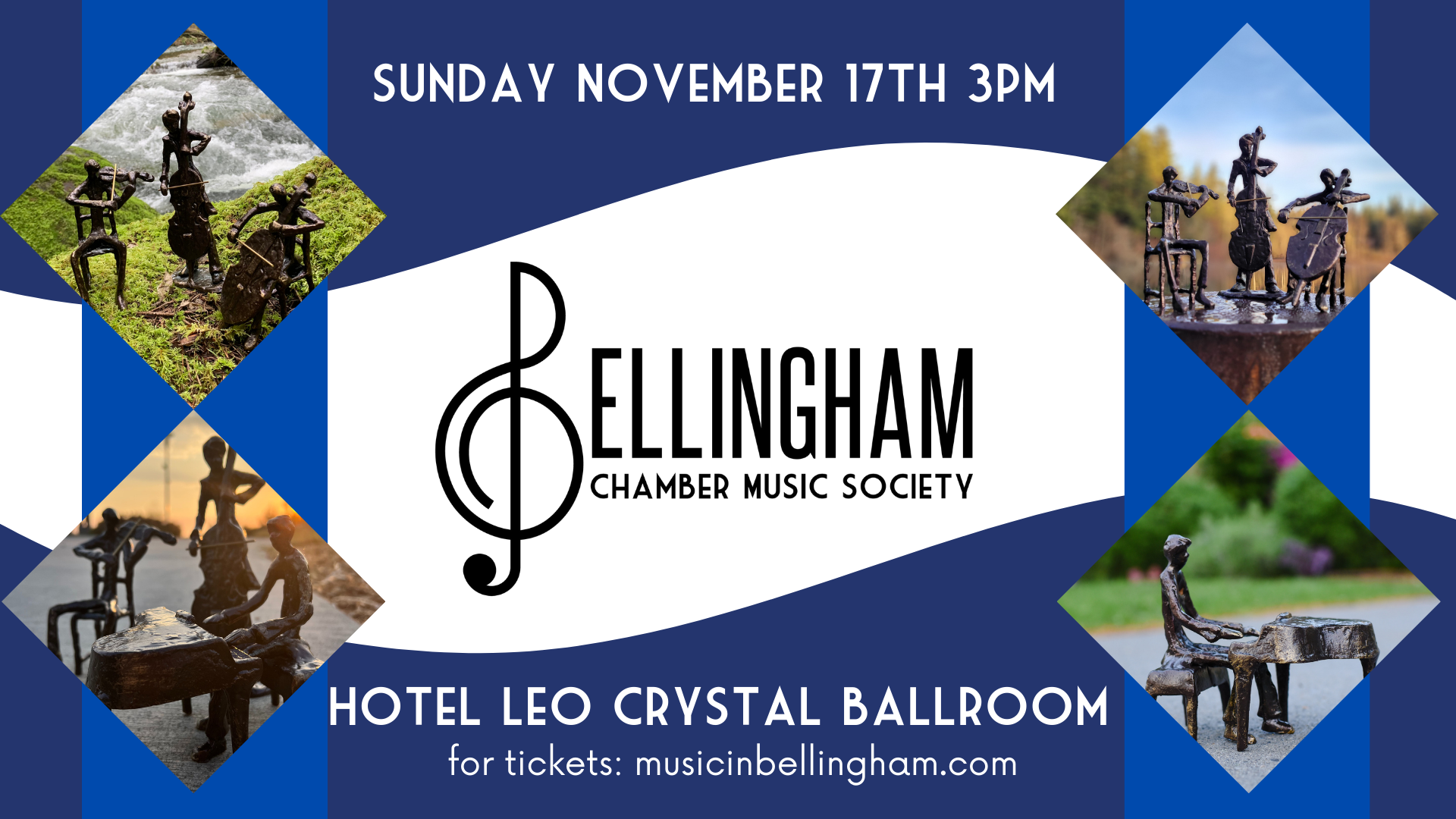
We dedicate today's concert to all those around the world who are suffering from the violence of war and other humanitarian crises. We hold in our hearts the innocent lives that have been lost and the survivors whose lives have been touched by unspeakable horrors. We honor those whose fierce determination to promote peace and security in our world has led to great personal suffering and loss. We offer this performance with love in our hearts and thank you for sharing in this emotional journey with us.
Guest Instrumentalists
Jill Whitman, harp
Eli Schille-Hudson, guitar
Kay Reilly, marimba
Concert Program
“El Cant Dels Ocells”
(Traditional Catalan Christmas song and lullaby)
Arr. Rebecca Rufin
Performed by Sherrie Kahn, soprano
Jill Whitman, harp
A Ceremony of Carols, Op. 28
Benjamin Britten (1913–1976)
Arr. for harp and chorus by Julius Harrison
“Procession”
“Wolcum Yole!”
“There is no Rose”
“That yongë child”
“Balulalow”
Soloist: Sherrie Kahn, soprano
“As dew in Aprille”
“This little Babe”
“Interlude”
Jill Whitman, harp
“In Freezing Winter Night”
Solo duet:
Annika Craig, soprano
Jason Morgan, tenor
“Spring Carol”
Solo duet:
Annika Craig, soprano 1
Joanna Wiebe, soprano 2
“Deo Gracias”
“Tomorrow Shall Be My Dancing Day”
(Traditional English carol)
Arr. by John Rutter (b. 1945)
INTERMISSION
Carols and Lullabies: Christmas in the Southwest
Adapted by Conrad Susa (1935–2013)
“¡Oh, mi Belén!” (Biscayan)
“El Desembre Congelat” (Catalonian)
"Alegría” (Puerto Rican)
Soloists:
v. 1, Eric Morgan, tenor
v. 2, Jason Morgan, tenor
v. 3, Eric Morgan and Jason Morgan
"A la Nanita Nana" (Spanish)
“Las Posadas” (Spanish)
Solo quartet:
Jason Morgan, tenor
Eric Morgan, tenor
Roger Clark, baritone
Norman Hale, bass
“Campana sobre Campana”
(Andalucian)
“En Belén Tocan a Fuego” (Castilian)
Soloists:
v. 1, Sara Negishi, soprano, Amy Nielsen, alto
v. 2, Jason Morgan, tenor
v. 3, Joanna Wiebe, alto
“El Noi de la Mare” (Catalonian)
Solo quartet:
Annika Craig, soprano
Amy Nielsen, alto
Jason Morgan, tenor
Eric Morgan, baritone
“Chiquirriquitín” (Andalucian)
“El Rorro” (Mexican)
“¡Fum, Fum, Fum!” (Traditional Catalonian carol)
Arr. Conrad Susa
“El Cant Dels Ocells” (The Song of the Birds) is a traditional Catalan Christmas song, made popular in the twentieth century by cellist Pau Casals. While living and performing in exile to protest Francisco Franco’s repressive dictatorship, Casals often ended his concerts with the piece as an homage to his native Catalonia. The Catalan populace embraced this gesture and essentially adopted “El Cant Dels Ocells” as the region’s national anthem, symbolizing freedom and peace.
Today you will hear an unusual arrangement for harp and soprano voice, a talented collaboration between Deborah Brown, Sherrie Kahn, and Jill Whitman. The sustained, celestial accompaniment of the harp imparts an aura of reverence and mystery. The soprano voice enters poignantly to describe the adoration of the birds who sing and celebrate the miraculous birth that presages Christ’s defeat of death. For an anthem of joy, the work’s G minor setting is curiously melancholy, but hauntingly beautiful, aptly expressing the soul’s longing for resolution and release. In this musical vignette, the simple creatures of nature are the first to discover, understand, and proclaim the profound sacrifice of God’s gift and the love it embodies.
Against the backdrop of World War II’s horrific destruction and inhuman cruelty, Benjamin Britten (1913–1976) composed his ethereal Christmas cantata, A Ceremony of Carols. The acclaimed musician journeyed from his native England in 1939 as the war began, taking advantage of receptive audiences in the United States and, incidentally, avoiding conscription into the British army. By March of 1942 Britten felt compelled to return to his homeland and demonstrate his loyalty to a nation now devastated and demoralized by blitzkrieg bombings and severe rationing. A Ceremony of Carols was composed during his trans-Atlantic voyage on a Swedish cargo vessel, the work’s genesis coinciding with the constant threat of U-boat attacks and the uncertainty of Great Britain’s survival.
For his text Britten chose several fifteenth- and sixteenth-century medieval poems from The English Galaxy of Shorter Poems, a handbook he purchased during the ship’s stopover in Halifax, Nova Scotia. The archaic mix of Latin and Middle English links this twentieth-century work to the unwavering convictions enjoyed by previous ages, and proposes faith as an enduring truth. Britten’s innovative use of the harp as sole accompaniment further accentuates the austere fervency of the words and melodies. The early manuscript called for women to sing three treble lines. At publication, however, Britten suggested the work be performed by boy sopranos, and this tradition has been widely followed in recordings. Years later, as the cantata proved popular, Britten authorized a four-part choral arrangement, with men’s voices frequently doubling the treble parts.
The composer’s original scoring emphasized the pure and simple ideal of faith, with angelic voices paying homage to the Christ child. However, the lower registers provide a wonderful richness and depth of tone. Regardless of the vocal arrangement, a deep serenity and sincerity of belief pervade the work, emphasizing Britten’s desire to restore hope in a world of chaos.
A Ceremony of Carols opens dramatically with a procession of treble voices united in a haunting Gregorian chant, “Hodie Christus natus est” (Today Christ is born). The solemn, emphatic plainsong invokes a holy tradition of devout Christian adherents and protectors of the sacred word. The following movement, “Wolcum Yole!” shifts dramatically to an exuberant celebration of Christ’s miraculous birth, the New Year, and the new age that this wondrous event portends. The choir sings boisterously, nearly hysterical with joy, while the accompanying harp sounds a relentless two beats in every measure, driving the momentum forward toward the promise embodied by the newly born.
Movement three, “There is no Rose,” contrasts the frenzy of “Wolcum Yole!” with a tender homage to the Virgin Mary. The harp continues its confident two-beat emphasis, but this pattern is disrupted by assertive triplets in the vocal line celebrating the miracle of Jesus’s birth that departs from all previous understanding. The accompaniment provides further contrast to the vocal line through Britten’s use of regular descending bass notes, whereas the treble melody primarily ascends. This transformative musical tension aptly encapsulates the climactic textual moment of “Transeamus” or “crossing over” from earthly turmoil to heavenly peace. The movement ends in a mysterious hush, creating space to discover the sanctity of silence.
The following lullabies, “That yonge child” and “Balulalow,” reiterate the familiar Christmas theme of loving devotion between mother and child. However, Britten’s use of halting, off-kilter rhythms and unexpected dissonant melodies introduces an uneasy prescience that the birth of this babe signals a new world order. Movement five, “As dew in Aprille,” begins with a joyful proclamation of Christ’s supremacy and Mary’s worthiness. The choral voice adamantly unites in the first twelve measures and then suddenly divides into an irrepressible cascade of effervescent sound. This playful canon disassociates the idea of God’s supremacy from force, repeating with hushed certainty that humanity’s conquering savior “came al so stille,” softly and miraculously “As dew in Aprille.” The paradox of defenseless innocence triumphing over evil achieves a thrilling climax in the cantata’s most oft-performed movement, “This little Babe.” A dynamic, militaristic cadence pronounces Christ’s victory over death with utter confidence. Britten then brilliantly illustrates the desperate chaos of the battle with a strident four-part vocal fugue that ultimately resolves into a determined statement of faith.
The celestial harp interlude offers a comforting, peaceful respite and virtuosic demonstration of the instrument’s versatility. With melodic variations echoing the opening and closing plainsong chant, this exquisite movement unifies the entire work. Movement eight, “In Freezing Winter Night,” captures in sound the icy threat of darkness that paralyzes virtue in the absence of hope. Its discordant, angular chords and elongated 5/4 meter augment this discomfiture until a key change at the halfway point reinstates the Christ child as the deliverer.
Winter gives way inevitably to the warm promise of “Spring Carol,” a playful, dance-like soprano duet in which the harp mimics the gamboling leaps of newborn lambs. Praising this eternal cycle of rebirth, movement ten explodes with an ecstatic choral unison voice, “Deo Gracias” (Thanks to God). The emphatic narrative surges forward on the driving eighth notes of harp accompaniment, relating the doctrine of Adam and Eve’s fortunate fall, whereby it is only possible to comprehend the joy of salvation after experiencing the desolation of sin. Bell-like iterations of fervent praise reverberate between voice parts in a cacophony of ardor, from which consensus finally emerges whole in a magnificent statement of “gracias.”
Britten concludes A Ceremony of Carols with voices united in plainsong chant, just as it began. He returns to the steadfast conviction of an earlier era that can also enlighten the future. The chant bestows peace with the assurance that “Today Christ is born.” And like hands clasped in prayer, Britten positions these words to create a womblike space holding hope for humanity.
John Rutter’s (b. 1945) “Tomorrow Shall Be My Dancing Day” is inspired by a much loved English carol. Although a printed version appeared in 1833, the piece probably originated in the sixteenth century as part of a medieval mystery play depicting the life of Christ. A notable innovation is the lyrical use of Christ’s first-person voice and the portrayal of his mortal life as a jubilant dance. The chorus invites all humanity, the savior’s beloved, to join this rapturous dance. Rutter captures the optimism of the text with a lilting melody and an enchanting harp accompaniment. The uplifting theme is first sung by a small group, then emphatically restated in unison by the entire choir. Succeeding verses introduce intertwining harmonies and staggered entrances to musically replicate the communal hopefulness of the dance motif. Underlying the voices, the harp nimbly drives the tempo forward, never ceasing its playful entreaty for every soul to enter Christ’s covenant of love.
Conrad Susa (1935–2013) studied at the Carnegie Institute of Technology and Juilliard before embarking on a prolific career composing scores for theater, documentary films, and television, as well as five operas. His work Carols and Lullabies: Christmas in the Southwest was commissioned as a companion piece to Benjamin Britten’s A Ceremony of Carols by conductor and founder of VocalEssence, Philip Brunelle. Susa wrote with regard to the project, “After several years of me writing in doubt, a friend showed me a collection of traditional Spanish carols he had sung as a boy in Arizona . . . I noted their many connections with Renaissance music along with their homey, artful simplicity. The overriding image of a Southwestern piñata party for the new baby led me to add guitar and marimba to Britten’s harp and to compose connective music and totally re-conceive the carols.” Although Susa subtitled his composition “Christmas in the Southwest,” the individual movements draw inspiration from musical traditions originating in Biscay, Catalonia, Andalusia, and Castilla, as well as Puerto Rico, South America, and Mexico. In this way Susa embraces vibrant regional distinctions in addition to a communal Hispanic heritage that joyfully celebrates the Christ child.
Movement I, “¡Oh, mi Belén!” begins with regular eighth notes in the guitar accompaniment that suggest the donkey’s careful steps as it carries Mary to Bethlehem. The journey is long and difficult, but leads to a city radiant with light in anticipation of the holy birth. Susa represents the brilliance of this arrival musically with a rising sweep of choral harmony, as all four vocal parts enter for the first time. The virgin mother’s blessed deliverance at the end of an arduous journey parallels the idea of a pathway toward purity and light that any believer may follow. The movement’s final chord remains hanging and unresolved, as if the journey is far from complete.
“El Desembre Congelat” offers a playful contrast between the barren cold of winter and the fragrant rebirth of spring’s abundance. A white lily symbolizing the holy infant defies the cold and asserts life over death. Susa composes an exuberant call-and-response exchange between voice parts that connotes a childlike assurance of the joyful promise that is God’s greatest gift.
The instrumental introduction of “Alegría” takes a dramatic turn, with the marimba striking an insistent 6/8 rhythm and the harp delivering a pleading descant in C-sharp minor. A rich baritone melody tells the familiar story of Mary and Joseph finding no room at the inn. The refrain, however, celebrates the secret joy that Mary carries in her womb. The choir repeats variations of this exuberant chorus, imitating the forest birds that sing songs of delighted praise. Simple creatures perceive the inner truths that outward appearances conceal.
Following the exhilaration of “Alegría” is a haunting lullaby inspired by Britten’s “Balulalow.” Susa’s title phrase, “A la Nanita Nana,” has no translatable meaning, but replicates the murmur of a mother soothing her baby to sleep. The movement concludes with a blessing of angelic voices, then a strangely foreboding measure in which the guitar foreshadows trials to come, before Mary’s comforting refrain returns.
The Hispanic tradition of “Las Posadas” celebrates the struggle to find a safe space where Jesus could be born. Through the poignant voice of Joseph’s lullaby, Susa asks whether it is wise to allow the world inside this shelter to witness and share the savior’s miraculous birth. Initially, regular rhythms move forward confidently, but as solo voices enter, a shift to halting syncopation introduces an air of hesitancy. The tender melody aptly portrays the uncertain responsibility of becoming a parent, to say nothing of assuming earthly guardianship of the Messiah.
The bells ring out with the opening notes of “Campana sobre Campana,” tolling the joyous news of Christ’s birth and proclaiming that the babe is secure under God’s protection. Angels sing from the heavens, and shepherds answer their call, bringing humble gifts of wine, cheese, and butter to honor the child. The voices trade snippets of verse with raucous gaiety, then imitate the resounding sonority of the bells, inviting one and all to celebrate God’s supreme gift.
The poetic text of “En Belén Tocan A Fuego” urges listeners to come and see the holy flames illuminating the stable, for fire symbolizes the presence of God, evidence that the child is indeed God’s son. Verse two likens the baby to a white carnation, a symbol of incarnation by which the spirit of God became flesh. The blossom then transforms into a purple lily, signifying purity, rebirth, and eternal life, thus foretelling Jesus’s resurrection. Verse three depicts Mary cleansing the holy infant’s swaddling clothes, a metaphor for the washing away of human sin. Susa’s melody relates the story with a stately, almost plaintive tone, conveying the suffering that lies ahead for this innocent child. By contrast, Susa energizes the glistening fish, leaping and dancing in the water, with a lively, buoyant choral refrain and a flurry of sixteenth notes from the guitar. Jesus said, “Follow me and I will make you fishers of men” (Matthew 4:19). During early times of Christian persecution, the sign of the fish provided an identifying mark for believers. In Susa’s spirited rendition, the community of converts or faithful fish rejoice in the liberty of salvation through Christ.
Movements VIII and IX emphasize the wondrous power of this vulnerable child to gather worshipers from all paths of life. The warm harmonies and rocking rhythm of “El Noi de la Mare” ask simply, “What can we bring that will give him delight?” highlighting the impetus toward selflessness that Christ’s ministry embodied. Gifts of raisins and honey, olives, walnuts, and figs confirm the humble bounty of earth’s creation as the greatest treasure. A textual note explains that “Chiqirriquitín” is “probably a variant of ‘chiquero,’ meaning ‘stable,’ ‘manger,’ or ‘sty.’” Susa uses the word’s percussive consonants to playfully accentuate the irony of Christ’s birthplace. The townspeople shout excitedly, “Follow us to the manger!” and no one is deemed too lowly to approach the cradle of God. Nevertheless, revelry turns to awe and wonder as the stable scene is revealed and the onlookers begin to realize what it means to see God. Susa concludes his Christmas homage with a lullaby—the loving plea of all new parents for their newborns to peacefully go to sleep.
“El Rorro” surrounds the holy infant with very human emotions, but also recalls that this blessed babe is like no other. Worshippers gather in reverent awe and angels sing praises from the heavens. Still, underlying the adulation of each verse is the soothing phrase “rururru,” passed between choral voice parts. The babe must sleep and collect his strength, for tomorrow begins his life’s mission to redeem the world. The entire work ends with a quiet restatement of the melodic theme heard in “¡Oh mi Belén!” reminding the audience that one’s journey to Bethlehem’s wonder, hope, and fulfillment begins with accepting the guiding light of faith.
In composing the boisterous “¡Fum, Fum, Fum!” Susa drew inspiration from a sixteenth-century Catalan carol. He intended the piece as an encore to Carols and Lullabies: Christmas in the Southwest, and it surely delivers a rousing finale. “Fum” translates to “smoke” in Catalan, and the verses that follow refer to the cold night and the Christ child’s need for warmth and light. It has been suggested that the refrain, “fum, fum, fum,” mimics one blowing on a fire to intensify the flame. It may also be an onomatopoetic reference to the strumming of a guitar, the beating of a drum, or the rocking of a cradle. No matter the literal meaning, the imperative lyrics and insistent rhythms of the song deliver a command. A new and miraculous life has entered the world, which must not be ignored. Each of us has something to offer, whether it be warmth, praise, music, comfort, or light. The carol entreats us to engage, to kindle the fire. And the world is forever altered as we answer the call, allowing this fragile babe to enlighten our hearts.

El Cant Dels Ocells
En veure despuntar el major lluminar en la nit més ditxosa,
Els ocellets cantant, a festejarlo van amb sa veu melindrosa.
I l’aliga imperial pels aires van cantant amb melodia
Dient, “Jesús és nat per treure’ns del pecat, i darnos alegria.”
The star is shining bright,
it sheds a radiant light on this most holy night,
The birds lift their wings in throng, and carol along,
With melodious voices bringing songs.
The imperial eagle flies and echoes through the sky
repeats his song from high,
“Jesus is born to bring deliverance from our sin
And joy everlasting.”
A Ceremony of Carols
1. Procession
Hodie Christus natus est:
hodie Salvator apparuit:
hodie in terra canunt angeli:
laetantur archangeli:
hodie exsultant justi dicentes:
Gloria in excelsis Deo.
Alleluia! Alleluia! Alleluia!
2. Wolcum Yole!
Wolcum, Wolcum, Wolcum be thou hevenè king,
Wolcum Yole! Wolcum, born in one morning,
Wolcum for whom we sall sing!
Wolcum be ye, Stevene and Jon,
Wolcum, Innocentes every one,
Wolcum, Thomas marter one,
Wolcum be ye good Newe Yere,
Wolcum, Twelfthe Day both in fere,
Wolcum, seintes lefe and dere,
Wolcum Yole, Wolcum Yole, Wolcum!
Candelmesse, Quene of bliss,
Wolcum bothe to more and lesse.
Wolcum, Wolcum, Wolcum be ye that are here,
Wolcum Yole, Wolcum alle and make good cheer,
Wolcum alle another yere, Wolcum Yole, Wolcum!
3. There is no Rose
There is no rose of such vertu as is the rose that bare Jesu.
Alleluia, alleluia.
For in this rose conteinèd was Heaven and earth in litel space,
Res miranda, res miranda.
By that rose we may well see there be one God in persons three,
Pares forma, pares forma,
The aungels sungen the shepherds to:
Gloria in excelsis,
gloria in excelsis Deo.
Gaudeamus, gaudeamus.
Leave we all this werldly mirth, and follow we this joyful birth.
Transeamus, transeamus, transeamus.
Alleluia, res miranda, pares forma, gaudeamus,
Transeamus, transeamus, transeamus.
4a. That yongë child
That yongë child when it gan weep
With song she lulled him asleep:
That was so sweet a melody
It passèd alle minstrelsy.
The nightingalë sang also:
Her song is hoarse and nought thereto:
Whoso attendeth to her song
And leaveth the first then doth he wrong.
4b. Balulalow
O my deare hert, young Jesu sweit,
Prepare thy creddil in my spreit,
And I sall rock thee to my hert,
And never mair from thee depart.
But I sall praise thee evermoir
With sanges sweit unto thy gloir;
The knees of my hert sall I bow,
And sing that richt Balulalow.
5. As dew in Aprille
I sing of a maiden that is makèles:
King of all kings to her son she ches
He came also stille there his moder was,
As dew in Aprille that falleth on the grass.
He came also stille to his moder’s bour,
As dew in Aprille that falleth on the flour.
He came also stille there his moder lay,
As dew in Aprille that falleth on the spray.
Moder and mayden was never none but she:
Well may such a lady Goddes moder be.
6. This little Babe
This little Babe so few days old,
Is come to rifle Satan’s fold;
All hell doth at his presence quake,
Though he himself for cold do shake;
For in this weak unarmed wise
The gates of hell he will surprise.
With tears he fights and wins the field,
His naked breast stands for a shield;
His battering shot are babish cries,
His arrows looks of weeping eyes,
His martial ensigns Cold and Need,
And feeble Flesh his warrior’s steed.
His camp is pitched in a stall,
His bulwark but a broken wall;
The crib his trench, haystalks his stakes;
Of shepherds he his muster makes;
And thus, as sure his foe to wound,
The angels’ trumps alarum sound.
My soul, with Christ join thou in fight;
Stick to the tents that he hath pight.
Within his crib is surest ward;
This little Babe will be thy guard.
If thou wilt foil thy foes with joy,
Then flit not from this heavenly Boy.
7. Interlude (harp solo)
8. In Freezing Winter Night
Behold, a silly tender babe,
in freezing winter night,
In homely manger trembling lies—
Alas, a piteous sight!
The inns are full; no man will yield
This little pilgrim bed.
But forced he is with silly beasts
In crib to shroud his head.
This stable is a Prince’s court, this crib his chair of State;
The beasts are parcel of his pomp,
The wooden dish his plate.
The persons in that poor attire
His royal liveries wear;
The Prince himself is come from heav’n;
This pomp is prized there.
With joy approach, O Christian wight,
Do homage to thy King,
And highly praise his humble pomp,
Wich he from Heav’n doth bring.
9. Spring Carol
Pleasure it is to hear iwis,
the Birdès sing,
The deer in the dale, the sheep in the vale,
the corn springing.
God’s purvayance for sustenance,
It is for man, it is for man.
Then we always to him give praise,
And thank him than.
10. Deo Gracias
Deo gracias! Deo gracias!
Adam lay ibounden, bounden in a bond;
Four thousand winter thought he not to long.
Deo gracias! Deo gracias!
And all was for an appil, an appil that he tok,
As clerkès finden written in their book.
Deo gracias! Deo gracias!
Ne had the appil takè ben, the appil takè ben,
Ne haddè never our lady a ben hevenè quene.
Blessèd be the time that appil takè was.
Therefore we moun singen.
Deo gracias! Deo gracias! Deo gracias! Deo gracias!
11. Recessional
Hodie Christus natus est:
hodie Salvator apparuit:
hodie in terra canunt angeli:
laetantur archangeli:
hodie exsultant justi dicentes:
Gloria in excelsis Deo.
Alleluia! Alleluia! Alleluia!
Tomorrow Shall Be My Dancing Day
Tomorrow shall be my dancing day;
I would my true love did so chance
To see the legend of my play,
To call my true love to my dance;
[Chorus] Sing, oh! my love, oh! my love,
my love, my love,
This have I done for my true love.
Then was I born of a virgin pure,
Of her I took fleshly substance
Thus was I knit to man’s nature
To call my true love to my dance. [Chorus]
In a manger laid, and wrapped I was
So very poor, this was my chance
Betwixt an ox and a silly poor ass
To call my true love to my dance. [Chorus]
Carols and Lullabies: Christmas in the Southwest
I. ¡Oh, mi Belén!
¡Oh, mi Belén!
Llegó tu hora bien amada, oh, mi Belén!
La luz que irradias sincesar
Es como un faro que nos guía
En nuestra ruta, noche y día.
¡Oh, mi Belén!
Oh, my Bethlehem!
Blessed is the hour the Savior comes to you.
Oh, my Bethlehem!
Light from your city shines so bright;
Burns like a beacon guiding us
straight on our way, in dark and daylight.
Oh, my Bethlehem!
II. El Desembre Congelat
El desembre congelat, confús es retira.
Abril de flors coronat, tot el món admira.
Quan en un jardí d’amor
Neix una divina flor.
D’una ro ro ro, D’una sa sa sa,
D’una rosa bella, fecunda y poncella.
El primer Pare causá la nit tenevrosa.
Que a tot el món ofuscá, la vista penosa;
Mes en una mitja nit,
Brilla el sol que n’és eixit.
D’una be be be, D’una lla lla lla
D’una bella aurora,
Que el cel enamora.
El més de maig ha florit,
sense ser encara.
Un lliri blanc y polit,
de fragancia rara.
Que per tot el món se sent,
de Llevant fins a Ponent.
Tota sa sa sa, Tota dul dul dul,
Tota sa dulcura, I olor amb ventura.
On December’s frozen ground,
Fear and doubt denying.
April wears a flower crown,
All the world admiring.
From a garden filled with love,
Springs a blossom from above.
With a lovely flow’r,
Comes the blessed hour.
God the Father made the night,
All in darkness shrouding,
Hiding from all human sight,
Worry, fear, and doubting.
Shining through the midnight clear,
Brightest light of all the year.
With a light so bright outpouring,
Heaven stands adoring.
Blooming at our humble feet,
Winter’s chill defying,
Springs a lily pale and sweet,
Fragrant and inspiring.
All the world can feel its pow’r,
Shining in our darkest hour,
All the sweetest fragrance,
Bless us with your radiance.
III. Alegría
Hacia Belén se encaminan Maria
con su amante esposo,
Llevando en su compaña
Un todo Dios poderoso.
[Chorus] ¡Alegría, alegría, alegría,
¡Alegría, alegría, y placer!
Que la Virgen va de paso
con su esposo hacia Belén.
En cuanto a Belén llegaron.
Posada el punto pidieron,
Nadie les quiso hospedar,
Porque tan pobres les Vieron. [Chorus]
Los pajarillos del bosque
Al ver pasar los esposos,
Les cantaban melodías
con sus trinos harmoniosos. [Chorus]
Walking slowly unto Beth’lem, Holy Mary, with her husband;
Trav’ling with them tho’ in secret,
is the Savior of all nations.
[Chorus] Joy, joy, joy,
Joy, joy, and pleasure!
For the Virgin passes by us
with her husband unto Bethlehem.
When unto Bethlehem they had traveled,
They were searching for a haven,
All the innkeepers refused them,
Dressed so poor and heavy laden. [Chorus]
The birds of the forest,
Seeing Mary and Joseph go by,
Serenaded them with melodies
And harmonious trills. [Chorus]
IV. A la Nanita Nana
A la nanita nana, nanita ea.
Mi Jesús tiene sueño, bendito sea nanita sea.
Fuentecilla que corres clara y sonora,
Rui señor q’en la selva, cantando lloras,
Callad mientras la cuna se balancea.
Blest be my baby Jesus.
My Jesus is sleepy, now go to sleep.
Crystal fountain resounding, clearly and brightly.
Nightingale in the forest, weeping so sweetly.
Hush, while the child is sleeping,
Laid in a cradle.
V. Las Posadas
¿Quieres que te quite, mi bien, de las pajas?
¿Quieres que te adoren todos los pastores?
A la rurru, niño chiquito, ya está arrulladito el niño.
Mi querido Padre, mi Dios y señor,
Que sufriste alegre del frio su rigor
A la rurru, niño chiquito, ya está arrulladito el niño.
Shall I have them open the stable before you?
Shall I bring the shepherds to praise and adore you?
Hush now, my darling; see the boy is almost sleeping.
My beloved father, my God and my Savior,
Happily you sleep through the harshness of winter.
Hush now, my darling; see, the boy is almost sleeping.
VI. Campana Sobre Campana
Campana sobre campana
Y sobre campana una
Asómate a la ventana y
Verás el Niño en la cuna
[Chorus] Belén, campanas de Belén
¿Que los ángeles tocan
Que nuevas me traéis?
Ding, dong! Ding, dong!
Recogido tu rebaño
¿A dónde vas, pastorcito?
Voy a llevar al portal
Requesón, manteca y vino. [Chorus]
Si aun las estrallas alumbran,
¿Pastor dónde queres ir?
Voy al portal por si el Niño,
Con Él me deja dormir. [Chorus]
Bell, after bell after bell is heard,
Gathering all who are able!
Come to the window and hear the word;
You’ll see a child in a cradle.
Oh ring the bells of Bethlehem.
[Chorus] What are the angels singing?
What news do they bring?
Now that all your flock is gather’d,
Tell me shepherd, where are you going?
We shall carry to the manger
Soft cheese and wine and butter. [Chorus]
Stars in the heavens are shining,
Shepherd, where do you want to go?
I'm going to the stable,
Hoping the child will let me sleep near him.
[Chorus]
VII. En Belén Tocan A Fuego
En Belén tocan a fuego,
Del portal salen las llamas.
Porque dicen que ha nacido
El Redentor del las almas.
[Chorus] Brincan y bailan los peces en el río.
Brincan y bailan de ver a Dios nacido.
Brincan y bailan los peces en el agua,
Brincan y bailan de ver nacido el alba.
En el portal de Belén
Nació un clavel encarnado
Que por redimir el mondo
Se ha vuelto lirio morado. [Chorus]
La Virgen lava panales
Y los tiende en el romero.
Los pajarrillos cantaban
Y el agua se iba riendo. [Chorus]
There’s a fire in Bethlehem,
In the stable see the flames!
For they say that born of a Virgin
From heav’n to earth He came!
[Chorus] Fish in the river are glistening and dancing.
The fish are jumping and dancing in the water.
Dancing and leaping to celebrate His birthday.
In Bethlehem’s humble stable
There’s a lovely white carnation,
It will grow into a purple lily,
Greet the Savior of the nations! [Chorus]
The Virgin Mary by the river
Hangs the swaddling clothes of Jesus,
All the birds around her are singing
And the river flows rejoicing. [Chorus]
VIII. El Noi de la Mare
Què li darem a n’el Noi de la Mare?
Què li darem que li sàpiga bo?
Li darem panses en unes balances,
Li darem figues en un paneró
Què li darem a n’el Noi de la Mare?
Què li darem a l’hermós Infantó?
Panses i figues a nous i olives
Panses i figues i mel i mató
Tampatantam, que les figues són verdes
Tampatantam, que ja madurarán;
Si no maduren el día de Pasqua,
Madurarán en el día del Ram.
What shall we give to the child of the mother?
What shall we bring that will give him delight?
Bring to him raisins in kingly abundance,
Bring him a plentiful basket of figs.
What shall we bring to the child of the mother?
What shall we bring to the beautiful boy?
Raisins and honey and olives and walnuts,
Raisins and honey and figs that are ripe.
What shall we do if the figs are still green?
What shall we do if the figs do not ripen?
If they do not ripen by spring,
they will ripen in the summer.
IX. Chiquirriquitín
¡Ay, del chiquirriquitín, metidito entre pajas,
¡Ay del chiquirriquitín, queridito del alma.
Por debajo del arco
Del portaliño
Se descubre a María, José, y el Niño.
¡Chiquirriquitín! . . .
Entre el buey y la mula
Dios ha nacido,
Y en un pobre pesebre lo han recogido.
Ay del chiquirriquitín,
He is laid in a manger bed.
Ay del chiquirriquitín.
Tiny darling of the soul.
Follow us to the manger.
Find them there in the stable,
Mary, Joseph, and Jesus, their holy baby.
Between the ox and the mule,
God has been born,
In the poorest of stables humbly abiding.
X. El Rorro
A la rururru, niño chiquito,
Duérmate ya mi Jesucito.
Del elefante hasta el mosquito
Guarden silencio, no le hagan ruido
Noche venturosa, noche de alegría.
Bendita la dulce divina Maria.
Coros celestiales, con su dulce acento,
Canten la ventura de este nacimiento.
A la rururru, my precious baby,
Please go to sleep now, my baby Jesus.
From the elephant to the mosquito,
Be silent now, do not disturb his slumber.
Come, oh night of blessing, night of great rejoicing,
Blessed be the sweet, divine Mary.
Celestial choirs with your sweet sound,
Sing the advent of this birth.
¡Fum, Fum, Fum!
Veinticinco de diciembre
¡Fum, Fum, Fum!
Nacido ha por nuestra amor
El Niño Dios, el Niño Dios,
Hoy de la Virgen María
En esta noche tan fría
¡Fum, Fum, Fum!
Pajaritos de los bosques,
¡Fum, Fum, Fum!
Vuestros hijos de coral abandonad
Y formad un muelle nido
A Jesús recien nacido.
¡Fum, Fum, Fum!
Estrellitas de los cielos,
¡Fum, Fum, Fum!
Que a Jesús mirais llorar
Y no lloráis, y no lloráis.
Alumbrad la noche oscura
Con vuestra luz clara y pura,
¡Fum, Fum, Fum!
The twenty-fifth of December,
Fum, Fum, Fum!
Born for us to love,
The holy infant, son of heaven,
Today of the Virgin Mary
On this night so cold.
Fum, Fum, Fum!
Little birds of the forest,
Fum, Fum, Fum!
Leave your fledglings behind,
And make a comfortable nest
For newborn Jesus.
Fum, Fum, Fum!
Little stars of the heavens,
Fum, Fum, Fum!
If you see Jesus crying,
don’t weep, don’t weep.
Light up the dark night
With your clear and pure light.
Fum, Fum, Fum!







